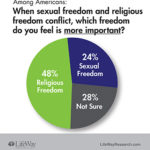NASHVILLE, Tenn.—Pastors believe not all divorces are created equal, but for many Americans, any reason is as good as another, LifeWay Research surveys reveal.
“Pastors make a distinction about the rightness of a divorce based on the reasons behind it,” said Scott McConnell, LifeWay Research vice president. “They want to account for the parts of Scripture that speak of possible rationales.”
However, Americans view virtually all reasons for ending a marriage in the same moral light.
In a phone survey of 1,000 Americans, LifeWay Research found 39 percent say divorce is a sin when an individual’s spouse commits adultery; 38 percent when the couple no longer loves one another; 38 percent when a spouse abandons the other; 37 percent when a spouse is abused; and 35 percent when a spouse is addicted to pornography. Close to the same (37 percent) say divorce is not a sin in any of these.
“About one in seven Americans are saying divorce is a sin in all of these cases, more than a third don’t think any of these would be a sin, and almost half believe some circumstances would be sinful, but not others,” McConnell said.
In a separate phone survey of 1,000 Protestant pastors, less than a third want to classify as sinful an individual divorcing their spouse for adultery (32 percent), abuse (28 percent) or abandonment (27 percent).
Porn addiction vs. lack of love
Pastors are somewhat more likely to call divorce a sin when a couple divorces over a pornography addiction (39 percent) and much more likely to consider it sinful if a couple divorces because the spouses no longer love each other (61 percent).
In their views on divorce, Protestant church members are aligned much more closely with the average American than with their pastor. Virtually the same percentage of Protestants believes a divorce is sinful when it is over adultery (44 percent) or an end to their feelings of love (46 percent).
Sign up for our weekly edition and get all our headlines in your inbox on Thursdays
Differences also exist between Americans from various regions of the country. Those in the Northeast and those in the predominately Protestant South are more likely to consider some possibilities as sinful compared to those in the West. Westerners are the most likely to say none of the reasons would be a sin (51 percent).
Non-Anglos
Non-Anglos frequently are more likely to consider as a sin the particular reasons for a divorce. Hispanics are more likely than Anglos to say it is sinful to divorce when one spouse commits adultery—45 percent compared to 36 percent. African-Americans are most likely to believe divorcing over abuse is a sin. Almost half (47 percent) say yes, compared to 36 percent of whites and 32 percent of Hispanics. Only a quarter (26 percent) of African-Americans say none of the reasons given are a sin, compared to 40 percent of whites and 37 percent of Hispanics.
Pastors show similar racial differences. African-American pastors are more likely than others to see as sin a divorce over adultery (52 percent), abuse (47 percent), and abandonment (44 percent).
Differences also exist between evangelical and mainline pastors. Evangelicals are more likely to believe a divorce based on the couple no longer loving each other is a sin—66 percent compared to 52 percent. They also are half as likely as Mainline pastors to say none of the possibilities is sinful. Only 14 percent of evangelical pastors say that versus 28 percent of Mainliners.
“While most Protestant pastors view the sinfulness of divorce differently based on the reason for the divorce, this sensitivity is lost on their members,” McConnell said.
Survey methods
Researchers conducted the phone survey of Americans Sept. 19–Oct. 5, 2014, using Random Digit Dialing. Sixty percent of completes were among landlines and 40 percent among cell phones. Analysts used maximum quotas and slight weights for gender, region, age, ethnicity and education to reflect the population more accurately. The completed sample for all questions is 1,000 surveys. The sample provides 95 percent confidence the sampling error does not exceed plus or minus 3.5 percent. Margins of error are higher in sub-groups.
The phone survey of Protestant pastors was conducted Sept. 11-18, 2014. The calling list was a stratified random sample drawn from a list of all Protestant churches. Each interview was conducted with the senior pastor, minister or priest of the church called. Researchers weighted responses by region to reflect the population. The completed sample is 1,000 surveys. The sample provides 95 percent confidence the sampling error does not exceed plus or minus 3.1 percent. Margins of error are higher in sub-groups.
















We seek to connect God’s story and God’s people around the world. To learn more about God’s story, click here.
Send comments and feedback to Eric Black, our editor. For comments to be published, please specify “letter to the editor.” Maximum length for publication is 300 words.